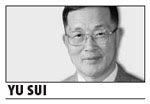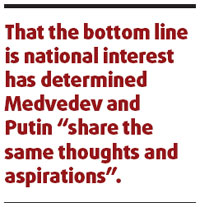Opinions divided on new partners
By Yu Sui (China Daily)
Updated: 2008-03-13 07:24
Updated: 2008-03-13 07:24
Russia's First Prime Minister Dmitry Medvedev has secured his victory after the election authority officially announced final results of the presidential election last Friday. He won because he had been recommended by outgoing President Vladimir Putin and his supporters practically saw him as the latter's embodiment, not to mention the unrivaled campaign resources at his disposal.
People still have many questions about the outcome of the Russian presidential election and they are focused on the "Medvedev-Putin partnership" as Putin becomes prime minister.
Putin's eight-year administration proved quite effective and won over many people's trust. That is why Medvedev chose the "Putin plan" as his campaign platform. The primary purpose for doing so was to win the election.

Popular support for Putin has hovered at 85 percent in the past year or so and few if any foreign commentators doubt it. His popularity has naturally benefited Medvedev as well, as he enjoyed 70 percent support and won the presidential election.
Medvedev emphasized at a press conference on March 3, which he has done on several occasions, the work priority of his administration, "is the continuation of the policies President Putin has implemented till today".
Putin congratulated Medvedev, saying Russian voters showed their support for his successor at the ballot box and "ensured the continuation of existing policies". He believed the election result indicated an "effective, responsible and proactive" civil society was taking shape in Russia.
A Russian political analyst pointed out that Russian citizens support Putin's policies, while Medvedev's campaign platform was built on keeping Putin's plan going, therefore the people had no reason not to trust the Putin-Medvedev team.
What people want to know is how Medvedev will carry out Putin's plan in the future power structure.
Putin's role has changed from prime minister to president and now back to prime minister.
The Russian media largely believe the people have accepted the Medvedev-Putin political alliance and support the Putin-Medvedev-United Russia (Party) power structure, but that will not prevent Medvedev from gradually building up his own unique profile.
The Western media are divided in this respect: some agree with their Russian counterparts while others do not. The view of the French news agency AFP is probably representative of the latter: With a young, inexperienced new president in the Kremlin and an older, experienced and popular former prime minister rehashing his old craft, no one is sure under the current circumstances who will wield decisive power.
The US current affairs magazine Newsweek has mused over multiple factors that might cause Medvedev and Putin to part ways, quoting a Russian anti-corruption official as saying: "Remember, we all said that Putin would be the puppet of the Yeltsin clan who put him in power - but he very quickly set his own course There has always been a magic to the office of a tsar in Russia Medvedev will surprise us all."
But, this opinion has overlooked a fundamental fact that former Russian President Boris Nikolayevich Yeltsin left Putin a complete mess, and he accomplished a national revival; Yeltsin is now history, but Putin remains in the state power center.
That the bottom line is national interest has determined Medvedev and Putin "share the same thoughts and aspirations".

Both Putin and Medvedev said the power of the future Russian president and prime minister will not change. Normally the president is the supreme commander of the armed forces, practices supervision over powerful government departments and is in charge of such affairs as formulating foreign policies, while the prime minister is focusing on the economy.
When Putin becomes Russian prime minister this time around, his relations with the president will perhaps be somewhat different from the past. Since the emphasis today is on following "Putin's plan" and "Putin's direction", it is not difficult to see him as a "spiritual leader" of some sort.
No wonder some Russian analysts predict that Putin will be in control of the nation in the first two years of his new job. He will act as a political strongman and make decisions, while Medvedev announces them. Given his international prestige, Putin is also expected to have a lot of say in foreign affairs.
Medvedev has said himself that "the relationship between him and Putin is a comradely partnership built on years of working together and mutual trust," which "will become a positive factor for national development." People will be watching if this is true.
Putin's achievements in his eight years as Russian president are widely acclaimed. Putin summed up his work as president like this: "The main issue is that the national institution we have right now cannot implement reforms effectively and this will be the threat and challenge to overcome in the next few years."
Some political analysts believe Russia needs urgently to change an economy suffering from semi-state-ownership, monopoly, corruption and the drying growth of raw materials; while some others maintain that Putin took some "relatively successful" reform measures, such as in taxation, finance, banking, and securities market.
But many tough areas are yet to be cracked, including administrative reform, ownership protection, housing, public utilities, and welfare. In addition to domestic issues, the nation will also face a looming global financial crisis, difficult mobility, fierce investment competition and food price hikes.
The risk-laden responsibility of the national economy will undoubtedly be on Putin's shoulders when he assumes the post of prime minister. Some people believe this shows exactly why he is willing to put himself in the line of fire.
The author is a researcher with the Research Center of Contemporary World
(China Daily 03/13/2008 page10)
|
|
|
|
|
|